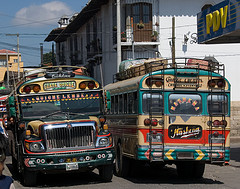Tires and Tribulations: Tire Rentals Gouge the Working Poor

Investigative journalist Ken Bensinger of the LA Times exposes yet another abuse of poor people in a car-dependent society. Well aware that their customers need tires to get to work, tire rental companies like Rent-a-Wheel and Rimco are setting up usurious rent-to-own plans for customers who are too poor to buy upfront:
When the tires on their Dodge Caravan had worn so thin that the steel belts were showing through, Don and Florence Cherry couldn’t afford to buy a new set.
So they decided to rent instead.
The Rich Square, N.C., couple last September agreed to pay Rent-N-Roll $54.60 a month for 18 months in exchange for four basic Hankook tires. Over the life of the deal, that works out to $982, almost triple what the radials would have cost at Wal-Mart.
“I know you have to pay a lot more this way,” said Florence Cherry, a 57-year-old nurse who drives the 15-year-old van when her husband, a Vietnam veteran, isn’t using it to get to his job as a prison guard. “But we didn’t really have a choice.” [LAT]
The price of tires rose by more than half between 2006 and 2012, as the median household income declined. Companies that used to sell custom rims to auto enthusiasts realized they could make more money gouging ordinary people who needed to get to work.
Tires account for just a tiny slice of the $8.5-billion rent-to-own market. But they stand out from the industry’s traditional fare because — unlike with a dinette set — giving back tires means not being able to drive to work.
“Tires are a necessity,” said Jim Hawkins, a University of Houston law professor who studies the alternative finance industry. “These customers are vulnerable because they have no choice.” [LAT]
Tire financing combines the worst aspects of borrowing and renting. The real interest rate on a rent-to-own tire plan can be up to 120% per annum, or three times the interest rate of the highest-interest credit cards. However, since you are renting the tires rather than borrowing the money to buy tires, you may get a visit from the police if you miss even one payment. Since the tire company owns the tires until the final payment, some police departments treat non-payment as a species of theft. To make matters worse, tire contracts can’t be discharged in bankruptcy because they are rentals rather than loans.
Bensinger has provided yet another example of how greedy companies make poverty ruinously expensive.
[Photo credit: pecooper98362, Creative Commons.]
[Photo credit:





